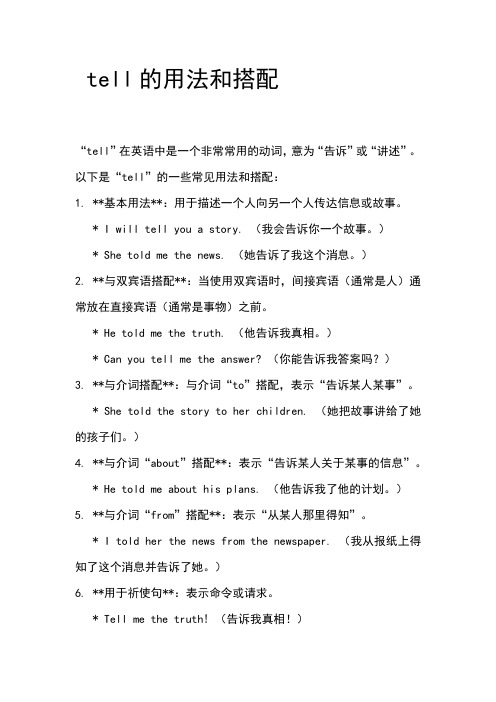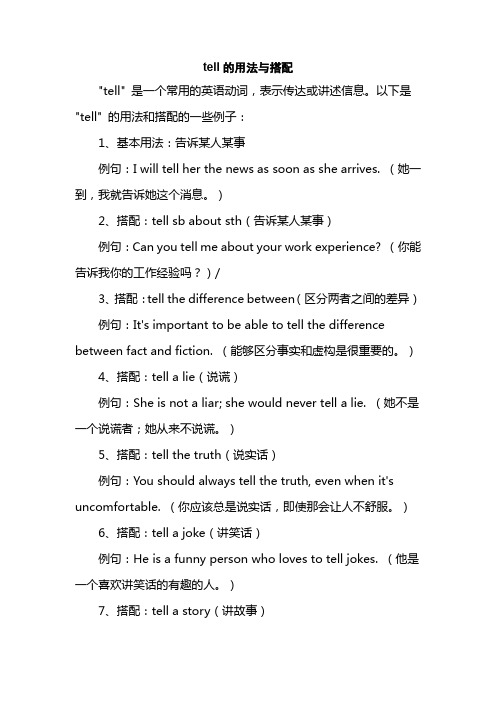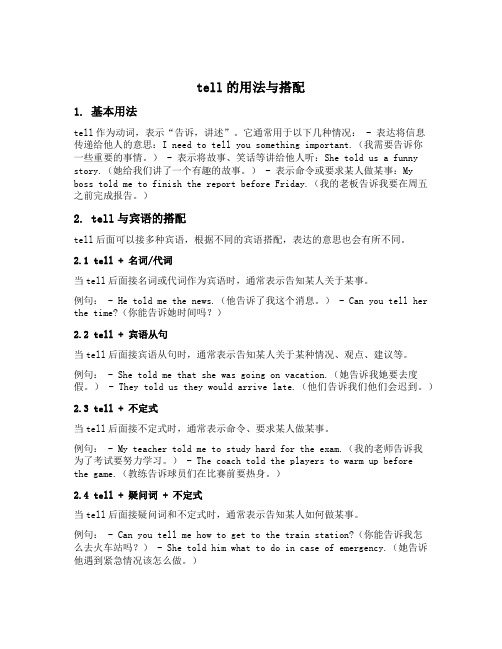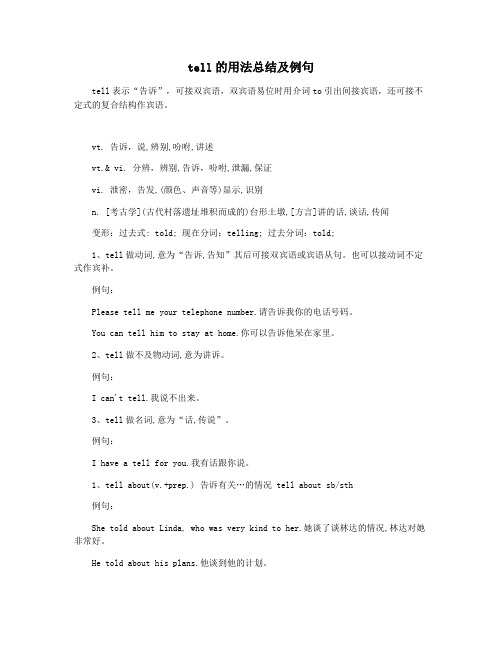tell地用法和常见搭配
tell的用法和搭配

tell的用法和搭配“tell”在英语中是一个非常常用的动词,意为“告诉”或“讲述”。
以下是“tell”的一些常见用法和搭配:1. **基本用法**:用于描述一个人向另一个人传达信息或故事。
* I will tell you a story. (我会告诉你一个故事。
)* She told me the news. (她告诉了我这个消息。
)2. **与双宾语搭配**:当使用双宾语时,间接宾语(通常是人)通常放在直接宾语(通常是事物)之前。
* He told me the truth. (他告诉我真相。
)* Can you tell me the answer? (你能告诉我答案吗?)3. **与介词搭配**:与介词“to”搭配,表示“告诉某人某事”。
* She told the story to her children. (她把故事讲给了她的孩子们。
)4. **与介词“about”搭配**:表示“告诉某人关于某事的信息”。
* He told me about his plans. (他告诉我了他的计划。
)5. **与介词“from”搭配**:表示“从某人那里得知”。
* I told her the news from the newspaper. (我从报纸上得知了这个消息并告诉了她。
)6. **用于祈使句**:表示命令或请求。
* Tell me the truth! (告诉我真相!)* Tell him to call me. (告诉他给我打电话。
)7. **用于间接引语**:在转述别人的话时。
* He told me that he would come later. (他告诉我他稍后会来。
)8. **固定短语**:有一些固定短语也包含“tell”。
* tell apart:区分,辨别* tell the truth:说实话* tell lies:说谎这只是“tell”的一些常见用法和搭配。
tell的用法与搭配

tell的用法与搭配"tell" 是一个常用的英语动词,表示传达或讲述信息。
以下是"tell" 的用法和搭配的一些例子:1、基本用法:告诉某人某事例句:I will tell her the news as soon as she arrives. (她一到,我就告诉她这个消息。
)2、搭配:tell sb about sth(告诉某人某事)例句:Can you tell me about your work experience? (你能告诉我你的工作经验吗?)/3、搭配:tell the difference between(区分两者之间的差异)例句:It's important to be able to tell the difference between fact and fiction. (能够区分事实和虚构是很重要的。
)4、搭配:tell a lie(说谎)例句:She is not a liar; she would never tell a lie. (她不是一个说谎者;她从来不说谎。
)5、搭配:tell the truth(说实话)例句:You should always tell the truth, even when it's uncomfortable. (你应该总是说实话,即使那会让人不舒服。
)6、搭配:tell a joke(讲笑话)例句:He is a funny person who loves to tell jokes. (他是一个喜欢讲笑话的有趣的人。
)7、搭配:tell a story(讲故事)例句:She loves to curl up on the couch with a good book and let the stories transport her to new places and times. (她喜欢蜷缩在沙发上,拿着一本好书,让故事带她穿越时空,来到新的地方。
tell的用法总结归纳 (2)

tell的用法总结归纳一、tell的基本用法tell 是一个常见的动词,具有多种不同的用法。
下面将对 tell 的常见用法进行总结与归纳。
1. 告诉某人某事:这是最常见的使用方式。
“tell sb. sth.” 表示“告诉某人某事”。
例如:- She told me the news.(她告诉了我这个消息。
)- Can you tell him to call me back?(你可以告诉他给我打电话吗?)2. 告知、警告:可以表示向某人解释或告知特定信息的意思。
- He told us about the upcoming changes.(他告诉我们即将发生的变化。
)- They were told not to enter the building without permission.(已被告知未经允许不得进入建筑物内部。
)3. 区分、辨别:在这种用法中,tell 后面通常跟形容词或名词,表示区分或辨别两者之间的差别。
- I have difficulty telling the twins apart.(我很难区分那对双胞胎。
)- Can you tell the difference between these two photos?(你能看出这两张照片之间的区别吗?)4. 询问:可以表示询问或请求意见。
- May I tell you something?(可以问你个问题吗?)- Could you tell me what time it is?(你能告诉我现在几点吗?)5. 透露、泄露:在这种情况下,tell 表示透露或披露某个秘密或实情。
- He accidentally told her the surprise party plans.(他不小心泄漏了给她的惊喜派对计划。
)- Don't tell anyone about this, it's a secret.(不要告诉任何人,这是个秘密。
tell的用法与搭配

tell的用法与搭配1. 基本用法tell作为动词,表示“告诉,讲述”。
它通常用于以下几种情况: - 表达将信息传递给他人的意思:I need to tell you something important.(我需要告诉你一些重要的事情。
) - 表示将故事、笑话等讲给他人听:She told us a funny story.(她给我们讲了一个有趣的故事。
) - 表示命令或要求某人做某事:My boss told me to finish the report before Friday.(我的老板告诉我要在周五之前完成报告。
)2. tell与宾语的搭配tell后面可以接多种宾语,根据不同的宾语搭配,表达的意思也会有所不同。
2.1 tell + 名词/代词当tell后面接名词或代词作为宾语时,通常表示告知某人关于某事。
例句: - He told me the news.(他告诉了我这个消息。
) - Can you tell her the time?(你能告诉她时间吗?)2.2 tell + 宾语从句当tell后面接宾语从句时,通常表示告知某人关于某种情况、观点、建议等。
例句: - She told me that she was going on vacation.(她告诉我她要去度假。
) - They told us they would arrive late.(他们告诉我们他们会迟到。
)2.3 tell + 不定式当tell后面接不定式时,通常表示命令、要求某人做某事。
例句: - My teacher told me to study hard for the exam.(我的老师告诉我为了考试要努力学习。
) - The coach told the players to warm up beforethe game.(教练告诉球员们在比赛前要热身。
)2.4 tell + 疑问词 + 不定式当tell后面接疑问词和不定式时,通常表示告知某人如何做某事。
tell的用法和句型 (2)

tell的用法和句型一、tell的基本用法和句型1. tell sb. something"tell"这个动词常用于告诉或传达信息给某人。
它需要两个宾语,即"sb."表示被告知的人,"something"表示被告知的具体内容。
例如:- She told me a secret.- He told his parents about his plans for the weekend.2. tell somebody to do something在这种结构中,第一个对象是一个人,第二个对象是一项行动或任务。
这种用法表明告知某人要做某事。
例如:- The teacher told us to complete the assignment by Friday.- My boss told me to attend an important meeting tomorrow.3. tell somebody (that) + 宾语从句在这种结构中,tell后面直接跟着宾语从句来传达信息。
注意,在宾语从句中可以选择使用"that"引导,也可以省略。
例如:- She told me that she would be late for the meeting.- He told us he couldn't come to the party.4. tell somebody something/anything/nothing, etc.利用这个句型可以指示对方回答或提供特定类型的信息或问题。
例如:- Can you tell me where the nearest supermarket is?- Please tell me if there's any news about the job interview.5. tell somebody apart/from这个短语意味着能够辨别两个相似的人或物。
tell的用法及短语

tell的用法及短语一级标题:Tell的用法及短语二级标题1:Tell的基本用法Tell是英语中常见的动词,其基本意思是“告诉”或“讲述”。
此外,Tell还有许多常用的短语和搭配。
在本文中,我们将详细介绍Tell的各种用法,并提供一些常见的短语。
在最简单的用法中,Tell通常后接一个宾语和一个间接宾语,表示将信息转达给某人。
例如:- She told me the good news. (她告诉了我这个好消息。
)- He told his friend a secret. (他向他的朋友透露了一个秘密。
)当tell与不定式连用时,表示命令、要求或建议某人去做某事。
例如:- I told him to be careful. (我告诉他要小心。
)- The teacher told us to study hard for the exam. (老师告诉我们要为考试努力学习。
)同时,tell还可以表示辨别、分辨出某事物或发觉某种情况。
例如:- Can you tell the difference between these two products? (你能分辨出这两种产品之间的区别吗?)- I can tell from her expression that she is not happy. (从她的表情我可以判断出她不开心。
)二级标题2:Tell与介词的搭配Tell还可以与一些介词搭配使用,这样会赋予Tell不同的意义和用法。
1. Tell about (谈论、讲述)此结构表示向他人介绍某事物或以口头形式传达信息。
例如:- She told us about her travel experiences. (她向我们讲述了她的旅行经历。
)- Can you tell me more about the project? (你能对这个项目多说点吗?)2. Tell off (责备、训斥)Tell off表示严厉批评或指责某人的言行。
tell的用法及例句 (2)

tell的用法及例句一、tell的基本用法"Tell"是一个常见的英语动词,通常表示告诉或传达信息的意思。
它可以用于多种不同的情境中,并且具有多种不同的搭配和短语。
下面将介绍tell的基本用法,并提供一些例句来说明其用法。
1. 作为及物动词使用"Tell"作为一个及物动词时,后面通常跟直接宾语,表示向某人传达某种信息。
例句:- She told me about her trip to Japan. (她告诉我关于她去日本旅行的事情。
)- He told his boss that he would be late.(他告诉老板他会迟到。
)2. 作为不及物动词使用虽然"tell"通常是一个及物动词,但在一些特定情况下也可以作为不及物动词使用。
这时,常与介词"on/upon"连用,意味着基于某些证据或迹象判断、推测或断言。
例句:- From the expression on his face, I can tell he is not happy.(从他脸上的表情看,我可以判断出他不开心。
)- It's hard to tell if it will rain tomorrow.(很难判断明天是否会下雨。
)二、tell的短语和搭配用法除了基本的使用方法,"tell"还有一些常见的短语和搭配用法,下面将列举并解释其中几个。
1. tell the truth(说真话)表示实话或坦白告诉对方真相。
例句:- She finally told the truth about what happened that night. (她终于如实讲述了当晚发生的事情。
)2. tell a lie(撒谎)表示做出虚假陈述。
例句:- He can't be trusted, he always tells lies. (他不可信任,他总是撒谎。
tell的用法总结及例句

tell的用法总结及例句tell表示“告诉”,可接双宾语,双宾语易位时用介词to引出间接宾语,还可接不定式的复合结构作宾语。
vt. 告诉,说,辨别,吩咐,讲述vt.& vi. 分辨,辨别,告诉,吩咐,泄漏,保证vi. 泄密,告发,(颜色、声音等)显示,识别n. [考古学](古代村落遗址堆积而成的)台形土墩,[方言]讲的话,谈话,传闻变形:过去式: told; 现在分词:telling; 过去分词:told;1、tell做动词,意为“告诉,告知”其后可接双宾语或宾语从句。
也可以接动词不定式作宾补。
例句:Please tell me your telephone number.请告诉我你的电话号码。
You can tell him to stay at home.你可以告诉他呆在家里。
2、tell做不及物动词,意为讲诉。
例句:I can't tell.我说不出来。
3、tell做名词,意为“话,传说”。
例句:I have a tell for you.我有话跟你说。
1、tell about(v.+prep.) 告诉有关…的情况 tell about sb/sth例句:She told about Linda, who was very kind to her.她谈了谈林达的情况,林达对她非常好。
He told about his plans.他谈到他的计划。
2、tell against(v.+prep.) 证实对…不利 tell against sb/sth例句:In an investigation, a new fact became known, which told againsthim.在调查中新发现了一件对他不利的事实。
Her poor eyesight is bound to tell against her applying for ajob.她视力不好,必然不利于她找工作。
- 1、下载文档前请自行甄别文档内容的完整性,平台不提供额外的编辑、内容补充、找答案等附加服务。
- 2、"仅部分预览"的文档,不可在线预览部分如存在完整性等问题,可反馈申请退款(可完整预览的文档不适用该条件!)。
- 3、如文档侵犯您的权益,请联系客服反馈,我们会尽快为您处理(人工客服工作时间:9:00-18:30)。
tell的用法和常见搭配tell的中文含义是:说;告诉;讲述。
例句:Tell him to wait for a few minutes, please.请告诉他等几分钟。
tell一般用作及物动词,常用于tell somebody to do something这个结构中,表示“要某人做某事”,如:Tell the kids to be quite, please. 请告诉孩子们保持安静。
类似的结构还有ask somebody to do something。
tell还常用于tell somebody something和tell somebody about something这两个结构中。
两个结构都有“告诉”的意思,它们的区别是:tell somebody something告诉某人某事(往往是不需要解释、说明的事);tell somebody about something向某人讲述某事(往往含有解释、说明的意味)。
试比较:Tell me your phone number.告诉我你的。
Please tell me something about your school life.请给我讲讲你的校园生活吧。
常用搭配:tell somebody to do something 告诉某人去做某事tell somebody something 告诉某人某事tell somebody about something 向某人讲述某事speak, talk, say, tell的用法区别这四个词的用法辨析是中考英语中考得最经常的同义词辨析之一。
综观各省市的中考英语真题情况,我们发现,中考对这四个词的考查主要侧重于其用法差异和习惯表达方面的不同。
因此,本文拟在这两个方面谈谈它们的具体用法和区别。
一、用法方面的区别1.speak 强调单方的“说”或“讲”,一般用作不及物动词,要表示“对某人说(某事)”,可用 speak to [with] sb (about sth)。
如:Please speak more slowly. 请说慢一点。
I spoke to [with] the chairman about my idea. 我跟主席说了我的想法。
2.talk 强调双方“交谈”,一般用作不及物动词,表示“同某人谈论(某事)”,可用talk to [with] sb (about sth)。
如:He was talking to [with] a friend. 他在同一位朋友谈话。
What are they talking about? 他们在谈论什么?3. say 强调说话容,一般用作及物动词。
表示“对某人说”,可用 say to sb。
如:Did you say anything (to him)? 你(对他)说了些什么?He said (that) he wanted to go. 他说他想去。
注:以下句型值得注意:据说他病了。
正:It is said that he is ill.正:He is said to be ill.4. tell 表示“告诉”,可接双宾语,双宾语易位时用介词 to 引出间接宾语。
如:I told him my name. 我把名字告诉了他。
He told his parents the good news. / He told the good news to his parents. 他把这个好消息告诉了他父母。
注:还可接不定式的复合结构作宾语。
如:Tell her to come at once. 叫她马上来。
He told the children not to play in the street. 他叫孩子们不要在街上玩。
另外,有时与介词 from 连用表示“区分”“辨别”等。
如:I cannot tell which is which. 我分不清哪个是哪个。
Can you tell true friends from false friends? 你能分清真假朋友吗?especially,specially,particularly■用于形容词或副词前,强调程度(通常译为“特别”),三者都可用。
如:It is particularly [especially, specially] cold today. 今天特别冷。
I was feeling particularly [especially, specially] tired this evening. 今天晚上我特别累。
有时也修饰动词。
如:I especially [particularly, specially] want to see that film. 我特别想看那部电影。
■用于强调目的(意为“特意”、“专门”), 通常用 specially 或 especially,一般与表目的的不定式或介词 for 短语连用。
如:We bought it specially [especially] for you. 这是我们特意为你买的。
I was asked specially to meet her. 特意要我去接她(from .yywords.)。
The book is written especially [specially] for children. 这本书是专门为孩子们写的。
■表示述某一事实之后,列举一个具有代表性的例子,作进一步强调,一般用especially 或 particularly,其后可接名词、介词短语、从句等。
如:We want to invite some friends, especially Jim and John. 我们想邀请几个朋友,尤其是吉姆和约翰。
He likes the country, especially in spring. 他喜欢乡村,尤其是在春天。
Noise is unpleasant, especially when you’re trying to sleep. 噪音是令人不愉快的,尤其是当你想入睡的时候。
escape与flee两者均有“逃”的意思,但有区别:1.escape 表示“逃脱”,主要指从被监禁或类似没有自由的状态中逃脱。
如:Two prisoners escaped last night. 昨晚有两名犯人逃走了。
The fish escaped from the net. 鱼逃出了网。
注:有时用于引申义。
如(from .yywords.):He escaped punishment. 他逃过了惩罚。
She escaped being caught. 她没被抓住。
The fact escaped my notice. 我没注意到这一事实。
2.flee表示“逃走”,着重逃的动作,强调逃走时的急促或仓促。
如:The burglars were frightened and fled. 夜盗们受惊逃走了。
The enemy soldiers were fleeing in all directions. 敌兵们四处逃窜。
注:表示“逃跑”时,escape 是不及物动词,而 flee 则可用作及物或不及物动词。
如:He fled (from) the burning house. 他从燃烧的房子逃出。
elder, eldest & older, oldest1. old 通常的比较级和最高级分别是 older, oldest。
可用于人或物,可用作表语或定语,可与 than 连用。
如:He is older than me. 他比我年纪大。
I’m two years older than he. 我比他大两岁。
The cathedral is the oldest building in the city. 这座教堂是城里最古老的建筑。
2. elder 与 eldest 主要用于家人之间表明长幼关系。
通常只用于人而不用于物,只用作定语而不用作表语,也不与 than 连用。
如:This is my eldest son (daughter). 这是我的大儿子(女)。
His elder brother (sister) works in a clothing factory. 他哥哥(姐姐)在一家服装厂工作。
注:在美国英语中,也可用 older, oldest 表示长幼关系。
如:older brother 哥哥 oldest daughter 最大的女儿elder 与 eldest 的区别是:前者指两者中年纪较大的, 而后者指三者或三者以上的年纪最大的。
如:one’s elder son 指两个儿子中年纪较大的一个one’s eldest son 指三个或三个以上的儿子中年纪最大的一个3. elder 和 eldest 作为形容词,通常只能用作定语,不用作表语;但若不是用作形容词(即其后不接名词)而是用作名词,则可以用作表语(此时通常有冠词或物主代词修饰)。
如:Jim is my eldest. 吉姆是我最大的孩子(from .yywords.)。
I’m the eldest in the family. 我是全家年纪最大的。
He was the elder of the two sons. 他是两个儿子中较大的。
He is my elder by two years. / He is two years older than I. 他比我大两岁。
easy与easily■easy 通常是形容词,有时也用作副词,但通常只用于某些特定的表达中。
如:Take it [things] easy. 别着急(慢慢来)。
Easy come, easy go. 来得容易去得快。
Easier said than done. 说来容易做来难。
Stand easy! (口令)稍息! (比 stand at ease 更随便)go easy 省点劲儿,别那么卖力(from .yywords.)go easy on (with) sb (sth) 对某人(某事)谨慎(从容,有节制)■easily 是形容词 easy 的副词形式,其用法很广。
如:I can easily finish the work. 我可以毫不费力地完成这工作。
easily 除表示“容易地”、“轻而易举地”外,还可表示“无疑地”、“可能地”。
如:She is easily the cleverest girl in the class. 她无疑是这个班最聪明的女孩。
That could easily be the answer we’re looking for. 那可能就是我们正在寻找的答案。
